Parish Leadership Day: "Walk On"
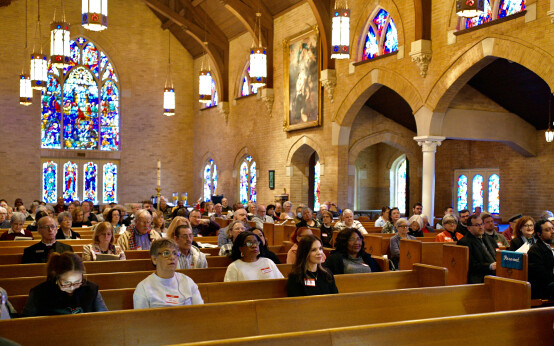
Parish Leadership Day brought together more than 150 Episcopalians from throughout the diocese to enjoy a day of worship, learning and fellowship. The event started with morning prayer, a commentary on leading a strong children’s ministry by the keynote speaker, breakout sessions on a variety of topics including how to onboard a vestry, grant writing, ministry of a parish treasurer, multi-cultural worship, prayer ministry and more. Everyone took a break at noon for fellowship and to eat a barbecue lunch before attending a last breakout session.
Before the day began, the Rev. Miguel Carmona instituted a new process for Spanish speakers in attendance by setting up a station where he translated morning prayer and the keynote speaker session in real time. He translated into a microphone to about 20 participants who each had a receiver and headphones so they could fully understand what was being said while participating in the event.
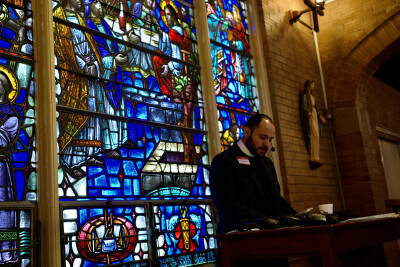
Morning prayer was led by Bishop George Sumner, lay leaders, the worship music team and the Very Rev. Rob Price, who gave a homily about church leadership discerning its path forward to carry out God’s will.
“At an essentially human level, a day like today is an opportunity to be asked, and to ask ourselves ‘where is north?’ …see if we are walking in a direction that takes us where we want to go and the best practices to get there,” Price said.
In the homily, Price talked of teaching Boy Scouts how to find North when lost. He tells them if they are lost at night to not worry, they will be awake when the dawn comes and know their way to go. He compared that to the disciples in the dark Sea of Galilee. “When we try to row with all the best practices at our disposal, we are facing strong headwinds, and at night, even the best maps won’t show us where to go. But in our fear let us stay awake and look for dawn, for the risen Jesus to come into our lives and show us the way, the way to his love, even over the broken trail we must walk on this side of the sea, asking ourselves not where we want to go but where Jesus would have us go….”
After morning prayer, the keynote speaker, the Rev. Dr. Cheryl Minor gave a talk titled, “Children’s Spirituality: Why It Is Important for Us All,” and asked everyone to think of a time as a child when they felt close to God. And she played some recordings of people sharing their childhood memories of that experience, such as a time when a young girl saw her father crying in deep grief over the death of their pastor. The little girl crawled into her father’s lap and threw her arms around him as he sobbed, and she said she felt God’s presence with them. Then Minor asked who do children share that kind of experience with and who will listen to them? “How lonely if they are not to be able to share.” She suggested a strong children’s ministry gives children a place of affirmation for these experiences.
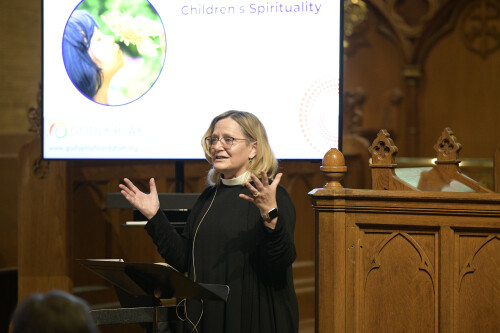
Minor comes with a lot of experience and expertise in the area of Christian formation for children. She is the Director of the Center for the Theology of Childhood, the academic/publishing arm of the Godly Play Foundation. For more than 25 years, she has served as co-rector at The Parish of All Saints' Church in Belmont, Massachusetts. With a degree in Music Education from Boston University, an M.Div. from Virginia Theological Seminary, and a Ph.D. in Psychology from Northcentral University in Scottsdale, Arizona.
During her keynote, Minor asked church leaders to consider what kind of space they offer children at their church. Is it a fold-out table in the basement or is it a warm, inviting space that says “we are glad that you are here?” It’s important for churches to pay attention to children and not cast them aside with busy-work while grownups get on with the business of worship. “I want to invite you to shift your view,” she said. Start to see children as a means to grace, and know that you are going to be filled with the presence of God.
There were several breakout sessions to attend including one on multicultural worship and welcome led by The Rev. Dr. Samira Izadi Page, the Rev. Dr. Christopher Stephen and Pastor Albert Cheng. Dallas is a main destination for many incoming refugees from around the globe providing the diocese with rich opportunities to form relationships with these newcomers in terms of service, ministry, partnerships and learning from their expertise.
For instance, Stephen came to the diocese as an ordained priest in Pakistan. When he answered a call to start a church in his native language in Dallas he approached churches who might be interested in such a partnership. He said there were two kinds of answers to his request, one being that the church said yes, you may use our building and resources, and another that said yes, you may use our building and resources but would you also like to be part of us?
“That made all the difference,” said Stephen who now leads a Pakistani and Indian worship service at Epiphany in Richardson. There are now events that bring all congregations together for worship that includes four languages, and unites everyone spiritually and socially. This is important for refugees and immigrants because “they are not in their own country and the culture here is foreign to them,” Stephen said. “It’s harder for them to integrate with others because of cultural and linguistic differences and it doesn’t feel safe, and by that, I mean they are afraid to make a mistake and the idea that they don’t know that culture keeps them intimidated,” Stephen said. Social opportunities provide assimilation and deeper understanding for all. “Church integration means both sides move little by little toward each other,” he said.
All parishes need a pragmatic ministry of finances. Diocesan Treasurer Rebecca Wellborn led a session on the ministry of a church treasurer and spoke about specifics such as working with the vestry for budgeting, understanding investments, helping ministry leaders stay within their budget, the ins and outs of restricted funds among many other topics. But she made it clear that first and foremost being a church treasurer is a ministry.
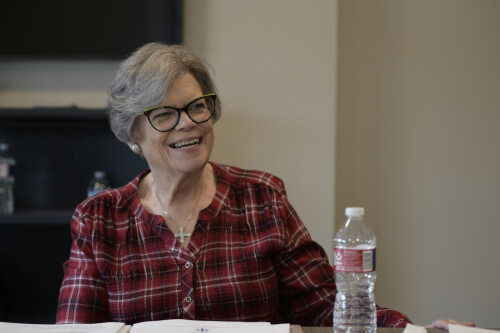
“The work of the treasurer is overseeing all aspect of the church’s finances and reporting to the vestry in a language they can understand,” Wellborn said. “The call to serve as treasurer is to discern the goal to build a budget, be confident in obeying the rules, include the Word of God, tell the whole truth in love, and trust in the presence of the Holy Spirit.” She also addressed other aspects such as financial reporting, cash flow management, IRS reporting requirements and marketing the stewardship campaign.
Another important ministry for churches to consider is creating an intercessory prayer team to pray over the church, clergy, staff, stewardship and missions. “This is the most important ministry your church can have,” said the Rev. Chase Skorburg who is the rector at Good Shepherd in Cedar Hill. “Prayer has to be first because it’s the Lord that makes everything happen.”
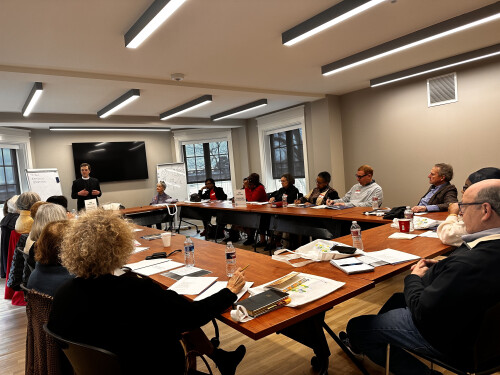
He also said that when building a prayer team don’t worry about making it perfect because prayer can be intimidating for some people. Just make it simple. When trying to recruit for this ministry make it clear that no one is asking anyone to pray in a beautiful complicated way, just simply asking God for help. An intercessory prayer ministry impacts church life in a huge way. “You have to put God first by way of prayer and calling on the name of the Lord” Skorburg said. “Total dependence on God is the right comportment for our souls, always.”
Another key ministry of parish life is adult formation, said the Rev. Matt Rossi, curate at Church of the Incarnation. Regular Bible study is one of the absolute most important things you can do to form folks in your parish. No church should be without some kind of regular pattern of Bible study, he said.
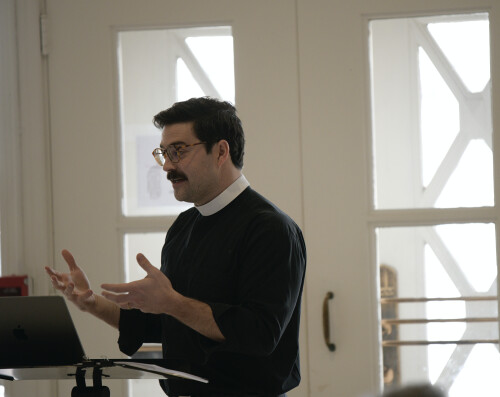
Rossi offered four types of study to consider, Lectio Divina which is when a passage of scripture is read out loud four different times, “soaked in prayer,” and also includes meditation, response to God in prayer, and contemplation. Another type of study is inductive Bible study where there is observation about the Bible text, interpretation of what it’s saying and then application for modern readers. A third kind of study is creative engagements such as journaling, artistic encounter, memorization/recitation and other ways of facilitating that encounter in the text that may be non-traditional. Lastly, there are prepared studies, that are put together professionally that guide people through the text with questions, and those can be great, but worth vetting with others before using it.
The program also offered a Spanish-language session that was divided into three parts led by Carmona, the Rev. Lino Lara, and the Rev. Fabian Villalobos. Carmona established the grounding of our Baptismal Vocation in the text of Genesis 1 and 2. God created humanity to take the creation that He created and helped it reach its fullest potential. Our baptism invites us into this state once again, having it been redeemed from sin by our Lord, Jesus Christ. Lino focused his talk on why is it beneficial to heed the baptismal call to a vocation of service. Finally, Villalobos focused on the practical things that we can do that help us live into this vocation.
Para la sesión en español, la dividimos en tres partes. Una dirigida por el Padre Lino, otra dirigida por el Padre Fabián y otra dirigida por el Padre Miguel. Al comenzar, el Padre Miguel estableció los cimientos de nuestra Vocación Bautismal en el texto de Génesis 1 y 2. Dios creó a la humanidad para tomar la creación que Él creó y ayudarla a alcanzar su máximo potencial. Nuestro bautismo nos invita a este estado una vez más, habiendo sido redimida del pecado por nuestro Señor, Jesucristo. El Padre Lino centró su plática en por qué es beneficioso atender al llamado bautismal a una vocación de servicio. Finalmente, el Padre Fabián se enfocó en las cosas prácticas que podemos hacer para vivir esta vocación.
The day also included a session titled “The Impact Discipleship Movement: Building up Spiritual Organizers and Reconcilers in the Body” led by the Rev. Dr. Kwesi Kamau and Price. “We are thinking about learning and growing for a formation that makes us more like Jesus,” Kamau said. “So if I’m going to be made more like Jesus, as part of that process I’m going to have a social impact.” We have disciples who, because of their commitment to the Gospel, are working to being formed to be like Jesus, spiritually connected with God, having a full-bodied spiritual experience and becoming impactful for all the different aspects of life, he said.
He talked about social justice, and spiritual living and said those need to be merged because we view them separately. “It’s not framed that way in scripture,” he said. The reality is that the Gospel speaks to all of it in a very powerful and unique way. Because we have been hearing these stories in a particular way it’s sometimes hard for our brains to see it another way and not read the word from our present-day perspective and eyes with our own interest in mind.
The Very Rev. Dr. Neal Michell shared his expertise on training a new vestry, offering many useful tips in his presentation which also included a handout. In an anecdote Michell talked about a stewardship campaign he began at a small church where he was trying to raise money for mission. “I chose the theme of ‘Moving from Maintenance to Mission.’ What was so wrong with the theme? First, it was insulting to the hard work that many people were engaged in to keep this little parish afloat. Second, and most important for me to learn, these church leaders were afraid the bishop was going to close their church. To keep the doors of the church open – maintenance – was considered to be a success,” he said.
“There are better ways to phrase this noble ideal. A church can focus on outreach even without money. The church’s most precious gift is its people. Often, churches may not give much money to missions and outreach, but below the surface that church will have parishioners who volunteer in many community service organizations. Have a series of interviews at Sunday services, highlighting the volunteer ministry that flows from your small church.”
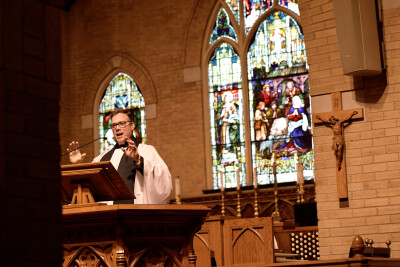
The day’s encouragement which began in Price’s homily also brought words of wisdom and perserverance for the Leadership Day’s ending. “Where is East? Where are you? Where does Jesus want you to go? Walk On.”

